Advertisement
After 50 Years, 'The Twilight Zone' Still Knows What Scares Us
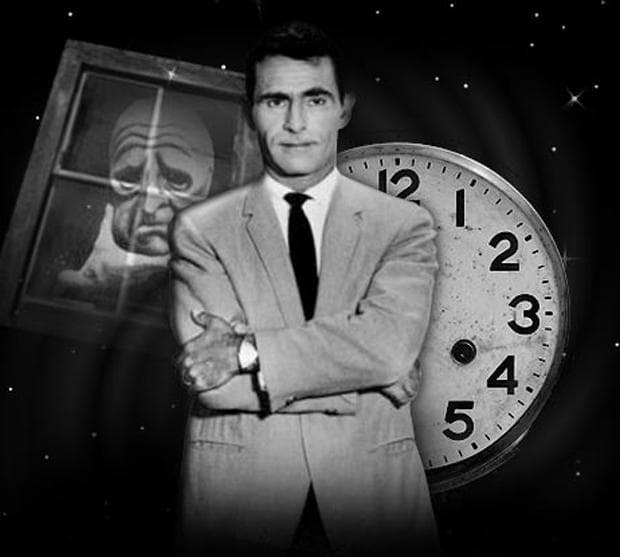
A HALF CENTURY AGO, a young writer walked across an empty set and pitched a new idea to television advertisers.
"What you're about to see, gentlemen, is a series called 'The Twilight Zone'," the young man said. "We think it's a rather special kind of series. The thing we're concerned with, the thing we're aiming for, the thing we're working toward is entertainment. This is a series for the storyteller."
Serling's Classic 'Twilight Zone' Intro
http://audio.wbur.org/storage/2009/10/news_1002_twilight-zone-top.mp3
One storyteller in particular. Fifty years ago on Friday, "The Twilight Zone" debuted on CBS. Creator Rod Serling wrote 92 of the 156 "Twilight Zone" scripts and hosted them all — from the very first show.
A man wanders a deserted town, there's no one to talk to because — in the last second, we find out — there is no town, he's hallucinating. He's an astronaut, confined in isolation to see if he can stand it. He can't:
Scene: 'Where Is Everybody?'
http://audio.wbur.org/storage/2009/10/news_1002_twilight-zone-a.mp3
And who can forget William Shatner as the airplane passenger convinced there's a gremlin on the wing? And who would believe him? He's a recovering mental patient whose previous breakdown had been... on an airplane:
Serling Hosts 'Nightmare At 20,000 Feet'
http://audio.wbur.org/storage/2009/10/news_1002_twilight-zone-b.mp3
"Nightmare at 20,000 Feet" and other "Twilight Zone" classics were screened two years ago at the Rod Serling Conference at Ithaca College in Ithaca, N.Y., where Serling lived and taught and where, after his untimely death at age 50, in 1975, his memorabilia was archived.
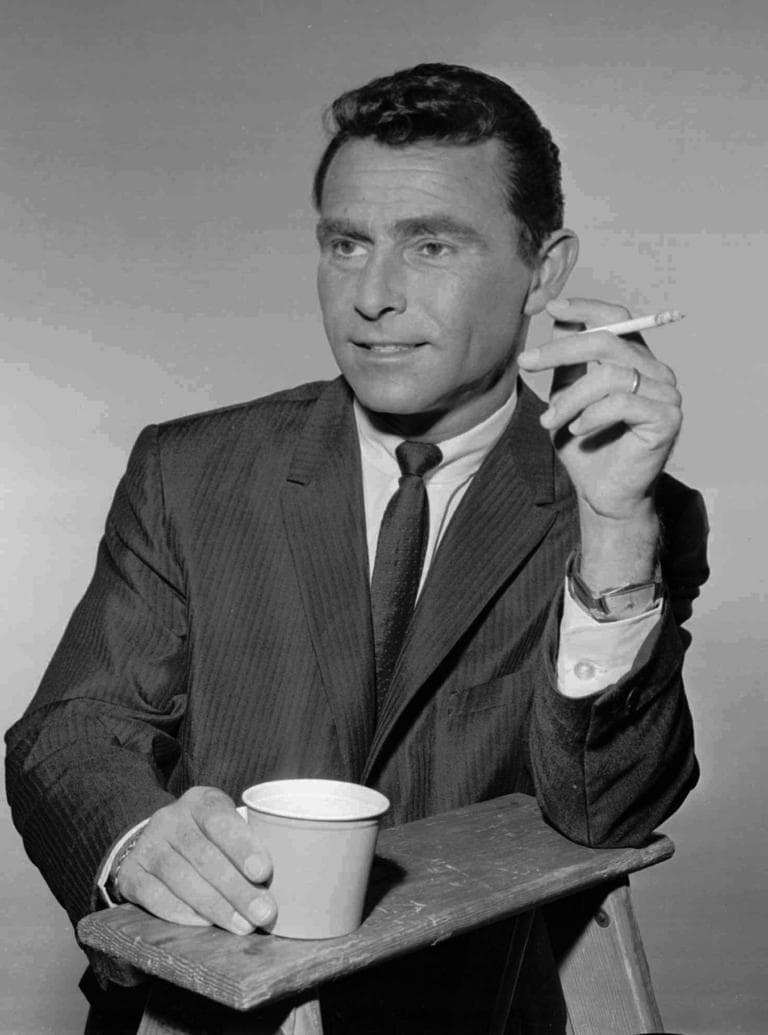
The conference was attended by film scholars, family members, fans and former students — like myself. I was privileged to have been in one of Rod Serling's writing classes at Ithaca, years ago.
On the 50-year anniversary of the show's debut, and as the school gets ready to hold another conference, I wanted to look again at Serling's impact and how much television has grown — or maybe hasn't — since he was such a part of it.
Fears Of Communists, Aliens And Corporate America
When the show debuted in the '50s, Americans feared Communists — real and imagined — body-snatching space aliens, soul-sapping corporate America. And "The Twilight Zone" was a place for them to feel these fears.
For Serling, it became the only place to write about them. He railed against McCarthyism and modern-day alienation.
His widow, Carol, speaking to me at the conference, said that made him radioactive to advertisers.
"Very definitely," she said. "It was a very serious problem. You know, the sacred cows of advertisers and the network executives made a very difficult time for him."
Serling adapted the screenplay for the movie "Requiem for a Heavyweight" from his Emmy-winning TV drama for CBS' "Playhouse 90." Serling was a driving-force in this new medium of TV, but the censorship became too much.
The breaking point: his planned teleplay about Emmett Till, the 14-year-old black boy murdered in 1955. Letters of protest poured into the sponsor, United States Steel Co., and then the script was watered down.
Serling took the news with anger, Carol said. "He was called the angry young man for a long time," she said, laughing. "After a while he said, 'I am not the young man anymore.'"
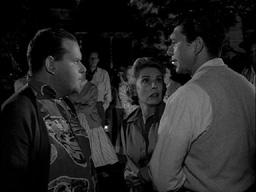
"Things he wanted to say, he really felt that television had this responsibility to hopefully inform and educate," Carol continued. "When he was trying to tell a story, they emasculated it. The Emmett Till story, which was called, at one point, 'Town Is Turned To Dust,' he said by the time they got through with it, the script had turned to dust."
The script had been so changed, Carol said, that it wasn't even a black child who was killed, it was a foreigner. "They ruined the script, and that made him very upset and angry," Carol said.
But there was always "The Twilight Zone."
Serling wasn’t writing about men in spacesuits just because he loved science fiction, said Marc Scott Zicree, an established television director and writer and author of the bestselling “ The Twilight Zone Companion."
“He was writing about the real world and using science fiction to hide his message and get it past the censors," Zicree told me.
Carol agreed. "He escaped into 'The Twilight Zone'," she said. "Because there he could say what he wanted to and nobody really bothered him."
Maybe that's because they didn't get the thinly veiled commentaries. Take, for example, "Monsters Are Due On Maple Street," in which paranoia strikes the residents of a neighborhood, and they all turn on one another, after they come to believe that human-looking aliens have invaded.
Carol said this is the episode that's in "so many of the high-school and junior-high textbooks" because of its themes of scapegoating and prejudice.
I asked Carol if "Monsters Are Due On Maple Street" is really about Emmett Till. "In a sense," she said.
Carol said Serling's lasting impact — made evident by the Star Trek convention-like passion of his fans, 50 years later — comes from the universal themes of his work. "They haven't gone away," she said. "Bigotry, nuclear war, man's inhumanity to man. All of these things are still right up on top."
And there was also a spiritual aspect to it all — the question: Are we alone?
So, I asked her, could "The Twilight Zone" make it on the air today? "I doubt it," she said.
What Would Rod Do?
“Born-again Christians often say, ‘What would Jesus do?’ in any given situation,” said Marc Scott Zicree, the keynote speaker at the conference. “In television, we say, ‘What would Rod do?’ ”
“'The Twilight Zone,' one of the things that was emblematic of it was the twist ending, the surprise," Zicree said. "One of his favorite writers was O. Henry, who was well-known for the twist ending at the early part of the 20th century. And so Rod loved those kinds of stories.”
Zicree isn’t surprised to be at the conference with people who know Serling’s episodes inside and out.
"He was really the first of his kind," Zicree said. "Because prior to Rod, it was the producers who ran the show, not writers. And when Rod created 'Twilight Zone,' he was the boss, and he was the first writer to really become a TV star. But he kept his artistic sensibility all the way through his life.”
Zicree may not be surprised, but Carol said she knows one person who would be. "I think it would be most surprising to Rod," she said, "to realize that people can recite chapter and verse — entire scripts."
Jodi Serling, one of Rod and Carol's two daughters, echoed her mother's sentiment.
"When he was facing his own mortality," Jodi said of her father, "the biggest honor would be just that someone recognized his name and that he was a writer. If he had known what's happening now — it's just amazing what's happening."
Jodi was surrounded by fans as we spoke. One, a fast talker, broke in. “Do you feel like, when he passed away, he did have a sense? Like he must have known at that point how influential he had been and how many people loved his work.”
“No. I don’t think he knew,” Jodi said. “He was before his time. I mean he was writing about computers taking over and controlling our lives before we even had a computer. Where does that come from? It’s almost like he lived another life and he knew it was going to happen.”
Homage To The Master
Contemporary shows, like "The Simpsons," regularly pay homage to Serling.
Here's Serling's talking doll:
http://audio.wbur.org/storage/2009/10/news_1002_twilight-zone-doll.mp3
Here's "The Simpsons":
http://audio.wbur.org/storage/2009/10/news_1002_twilight-zone-krusty.mp3
And then there is Serling's "Time Enough At Last," with Burgess Meredith playing book-loving bank clerk Henry Bemis after a nuclear holocaust. All that's left are books, but at least he can read. Until... he drops his glasses:
Scene: 'That's Not Fair'
http://audio.wbur.org/storage/2009/10/news_1002_twilight-zone-c.mp3
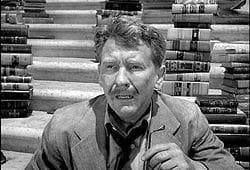
A painful commentary on human folly and nuclear ambitions. And fodder for another spoof — this time not by "The Simpsons," but by another of Matt Groening's animated sitcoms, "Futurama."
A fan at the conference gave me the "Futurama" take on poor Henry:
"Not only did he lose his glasses, but after he lost his glasses he said, 'Well, my eyesight isn't so bad,' " the fan explained.
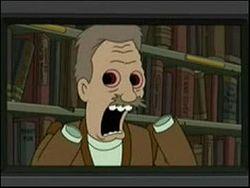
"And so then after that, his eyes then fall out. After his eyes fall out, he's like, 'That's OK, I can read Braille.' And then his hands fall out. It's very famous. It's an icon in television."
But why? The shows were clever, but why do "The Twilight Zone" episodes remain so profoundly popular?
“This is our common mythology," Zicree told me. "We’ve all grown up watching these episodes."
'This Is A Wonderful Time For You'
Rod Serling was very clear about what propelled him into writing, Zicree said. It was the war.
“He was a paratrooper in World War II, and jumping out of airplanes into jungles full of men trying to kill him," Zicree said. "He was wounded, he had a shrapnel wound and was hospitalized. He came out of World War II with this burning need to get something off his chest. He needed to expunge that.”
But as furious as Serling often was, as angry as he was, he carried around in his heart, it would seem, this place that was Binghamton, N.Y., his hometown, that was America as it should be.
“I think he always had a longing for and an appreciation of the small-town life,” Zicree said. “Balanced, balanced man in that way — he had a good life, and a good working life.”
We heard that in a very intimate way at the conference's close.
"I'll tell you something that not too many people know about Rod during his final days on earth," said John Keshishoglou, who was dean of Ithaca's school of communications when Serling was a faculty member.
"When he was in the intensive care unit at the hospital, he asked for his audio recorder and he began dictating and reflecting on his mortality."
In a hushed auditorium, we listened to Serling's last recorded words. After his first heart attack, just before his death. In them, you hear his character:
http://audio.wbur.org/storage/2009/10/news_1002_twilight-zone-tapes.mp3
I don't really have a fear of death that I thought. What I do have is a terrible awareness of how little time there is to accomplish so many of the things that you want to accomplish.
What seemed to be the most predominant in my fears is that it was a relationship that was going to end. It would end. It wouldn't be with Carol. It wouldn't be kids. It wouldn't be Jodi and Anne. There wouldn't be any opportunity to watch their growth. To see the good things happen to them.
Who knows what Serling might have accomplished had his life not been cut so short. I posed that question to Zicree.
“It’s fascinating," he said. "I’m sure he’d be writing about what’s going on with people being held without trial, people being tortured. He would definitely be taking a stand.”
In Rod Serling's voice on those recordings, you heard his many characters. The evening closed with a screening of "Walking Distance," the story of Martin Sloan, the ad executive who goes back in time to try to confront his younger self.
http://audio.wbur.org/storage/2009/10/news_1002_twilight-zone-martin.mp3
"I only wanted to tell you that this is a wonderful time of life for you. Don't let any of it go by without enjoying it. Won't be any more merry-go-rounds, no more cotton candy, no more band concerts. I only wanted to tell you that this is a wonderful time for you. Now, here, that's all Martin."
WBUR's Lisa Tobin compiled this essay for wbur.org.
This program aired on October 2, 2009. The audio for this program is not available.

